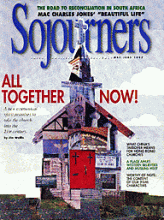Insights about community come from unexpected places. For example, in recent years coalition work on the negative impact of the World Bank and the International Monetary Fund (WB/IMF) has given rise to reflections on Gods call to community living.
A faith-based group centered in Washington, D.C., with connections across the country, has challenged the WB/IMF for several years on their half-century of largely ineffective lending practices toward poor nations. Known popularly as the Religious Working Group, this interdenominational gathering has acquired increasing expertise in the arcane and complex world of international borrowing and lending.
They have mastered concepts such as "multilateral and bilateral debts," "preferred creditor status," "structural adjustment programs," and many more. They continually discuss effective approaches to the staffers and directors at the international lending institutions, and assess the strategies employed after each meeting with those policy makers.
Each fall, on the occasion of the annual gathering of WB/IMF operatives from around the world, the Working Group holds a prayer service to ask divine guidance for themselves and these institutions in the all-important work of global development and justice. On Good Friday each year, they conduct a public Way of the Cross through the streets of Washington, D.C., stopping at the centers of economic power where decisions taken often result in Jesus being crucified again.
Predictably, a strengthening of ecumenical and community bonds has resulted from the countless hours that these Christians from various traditions have spent together. What is common in their theologies and ethical convictions has become so much more relevant than what divides the members of the Working Group.
Read the Full Article
